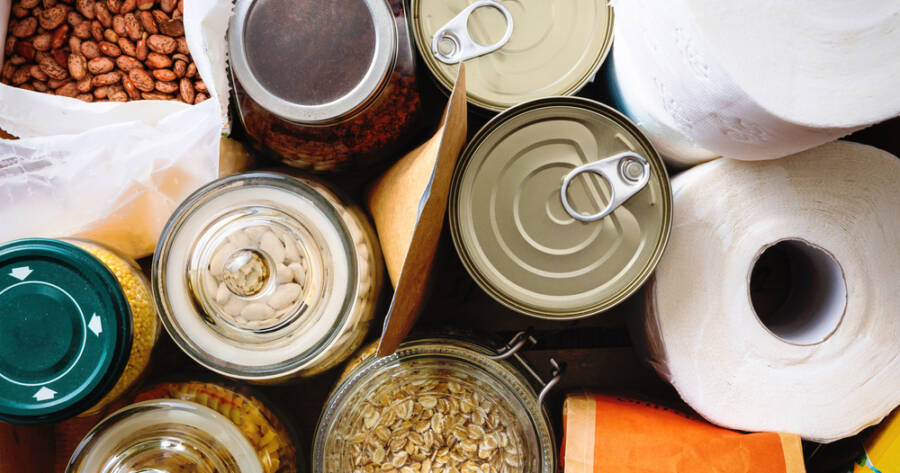Prepping doesn’t have to be extreme or overwhelming—it’s about being prepared for the unexpected in a practical, manageable way. Whether it’s natural disasters, economic downturns, or simple power outages, having a plan and the right supplies can make all the difference. By taking small, deliberate steps, you can equip yourself and your family with the confidence and resources needed to handle life’s uncertainties without stress or panic.
Start with the Basics: Food and Water Supplies
The foundation of any prepping plan starts with ensuring you have access to food and water during emergencies. Stocking up on non-perishable foods like canned goods, rice, and pasta is a simple way to begin. Aim for at least a few weeks’ worth of supplies, taking into account your family’s dietary needs.
Equally important is water—each person needs at least one gallon of water per day for drinking, cooking, and hygiene. By building this essential supply, you create a safety net for yourself and your family when services become disrupted.
Emergency Kits: Building a Ready-to-Go Bag
Having an emergency kit on hand is crucial, and creating a “bug-out” bag for each family member ensures you’re ready for sudden evacuations or evacuations when needed. Fill the bag with essentials such as first-aid supplies, flashlights, batteries, a multi-tool, spare clothing, and hygiene products.
Don’t forget to include important documents like IDs and insurance information in waterproof bags. Keep these kits easily accessible so that they can be grabbed quickly in an emergency. The goal is to be prepared for at least 72 hours without external help.
Power Outages: Backup Energy Solutions
Power outages can occur at any time, and having a plan for backup energy is essential. Begin with basic items like flashlights and extra batteries. Investing in portable power banks for charging phones or small devices can be a game-changer.
For longer outages, a portable generator is a worthwhile investment, but be sure to maintain and store it properly. Consider solar-powered options, which can be more sustainable in the long run. Understanding your energy needs will guide you in selecting the right backup systems for your home.
First Aid and Medical Supplies: Be Prepared for Health Emergencies
In a crisis, access to healthcare can be limited, so having a well-stocked first aid kit is vital. Include items for treating cuts, scrapes, burns, and sprains, as well as over-the-counter medications like pain relievers, antihistamines, and diarrhea medicine.
Don’t forget personal medical needs such as prescriptions, diabetic supplies, or allergy medication. It’s also wise to familiarize yourself with basic first aid skills. Having the knowledge and supplies to manage minor health issues can make a significant difference when medical care is unavailable or delayed.
Communication Plans: Stay in Touch During Emergencies
In emergencies, staying in touch with loved ones becomes crucial. Develop a communication plan that includes how to reach each other in case of power loss or cell service disruptions. Consider investing in a battery-powered or hand-crank radio to receive important updates.
Keep a list of emergency contacts in your kit, along with a pre-arranged meeting spot in case your family members need to evacuate. Having a plan for reliable communication will help you stay connected and informed, no matter the circumstances.
Home Security: Protecting Your Family and Property
Home security is an often overlooked aspect of prepping. In times of crisis, it’s important to have measures in place to protect your family and property. Start with simple steps like securing doors and windows, installing motion-activated lights, and ensuring your home is visible and well-lit at night.
If necessary, consider more advanced options such as security cameras, an alarm system, or even reinforcing entry points with security bars. Having the ability to protect your home will offer peace of mind during uncertain times.
Mental and Emotional Preparedness: Stay Calm in Crisis
Prepping isn’t just about physical supplies—it’s also about preparing mentally and emotionally. During emergencies, it’s easy to feel stressed or overwhelmed, which can impair decision-making. Practicing mindfulness, deep breathing exercises, or simple relaxation techniques can help you stay calm.
It’s also helpful to discuss potential scenarios with your family so everyone is on the same page. The more you mentally prepare for uncertainty, the better equipped you’ll be to stay composed and take action when needed. Resilience is just as important as having the right tools in an emergency.
Confidence in Preparedness: Ready for the Unexpected
Practical prepping is about taking proactive steps to ensure you and your family are ready for whatever comes your way. By starting small and gradually building your supplies and knowledge, you create a solid foundation that can help you navigate any emergency with confidence.
Remember, it’s not about being paranoid—it’s about being prepared. With the right tools, mindset, and strategy, you’ll be ready to face challenges, minimize stress, and provide safety and comfort for those you love, no matter the situation.

